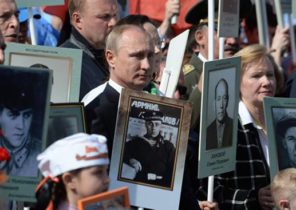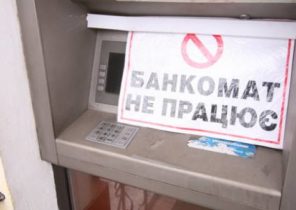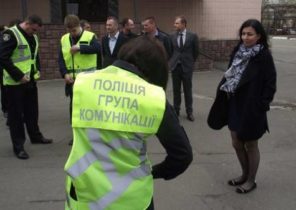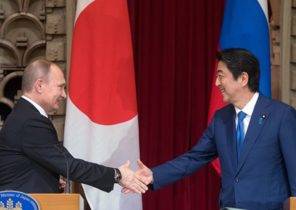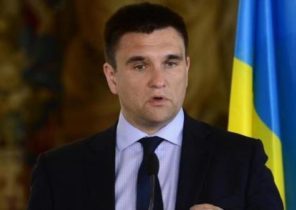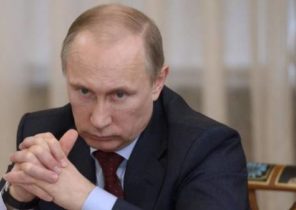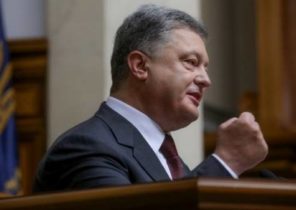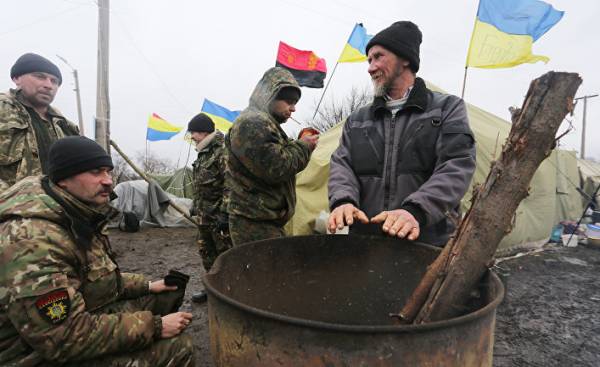
Krytyka Polityczna: the War in Ukraine continues for the fourth year, was recently the anniversary of the “referendums” held in the two unrecognized republics. As a result of military action, according to various estimates, killed up to 10 thousand people. After reading your book “the War that changed us”, the figure produces more impressions. You write that the turning point came in 2015: the time until the end of 2014 was a period of hard work of volunteers, when the state practically ceased to exist, but public rise. In early 2015, something has changed: the war has lost its meaning. What happened?
Paul Peninger (Paweł Pieniążek): First, the armed forces hardly functioned, they were collected from a relatively combat-ready units and staffed by volunteers. There were volunteer groups, which often consisted of people who had nothing to do with the army. In the first months it was possible to meet anyone: the seller, Manager, teacher, worker. The war proceeded. In Crimea, this was not possible: the events unfolded too quickly. The situation caught everyone by surprise: on the Maidan have not yet cleared the smoke, and in the Crimea have already started. This one was not ready. Donbass was different: remembering what happened in the Crimea, said: “We will not let this happen again.” It is surprising that so many people were ready to fight. If several years ago someone said that there will be war, volunteered would be 200 people, and then those who were not looking for any excuses, there were many thousands.
In early 2015 the time has come when the war finally lost sense, if in any military conflict is possible at all to make sense. Less often began to sound pompous promises, with which Ukraine has started almost every conversation that soon over Donetsk and Luhansk will fly Ukrainian flags. What happened, why this moment was important?
It was the end of the process, which began with the battle of Sloviansk in the spring of 2014 or even earlier, when the Russian army has intensified its operations in the Donbass. It was said that there pull together a few thousand soldiers, there were videos showing that in the Donbass moving tanks and artillery. The key role played by the battle for Slavyansk is a small town with about 20 inhabitants, situated on the East of Donetsk. It seemed that this is another locality that will be easy to discourage, to finally to encircle Donetsk. But the Ukrainians broke, and the separatists at the end of the first Minsk agreement failed to get a lot more territories.
Further battles for the Donetsk airport in January and February of 2015 began the final stage of this process. Ukrainians began to talk about the fact that everything can be returned, and that it has no chance. The idea was the same: just not to lose even more.
— Battles for Donetsk airport — this is an interesting episode. On the one hand, those who fought for him until the very end, became heroes. On the other, from your book that the struggle was pointless. This begs the question whether there was any real achievable goal?
— I spent a week in the village of Sands, which is located near the airport. I talked to fighters of “Right sector” (banned in Russia organization — approx. ed.), asking what they want. They stood in the old terminal of the Donetsk airport, but backed off when the separatists and Kiev signed the agreement. The hands of the separatists they have not filed and do not engage them in any contact. This operation was heavily criticized, and most of the combatants knew that the airport, which fly the shells, and which has left only a concrete slab, is a political, not a strategic goal. It was important to show the symbolic aspect of the struggle, the power of Ukraine and how much she is suffering from the Russian aggression.
— You write: “three years after the beginning of armed conflict in the East of Ukraine it ceased to be called “the war that changed us”. The force of his impact on society downplayed, the topic is forced out of consciousness as if it hides something dark, what no one wants to admit”. Who and how did that war?
— I think it changed everyone. We talked about the volunteers who risked their lives and went to the front to defend what they believed: the idea that Ukraine will regain the old borders, will change for the better, will find a good guide. The effects of the Maidan. The separatists, too, have experienced disappointment: the victory in Lugansk saved them from total collapse, may have given them a second life, but dashed their dreams. The militants, with whom I met, believed they were owed something they fought for Novorossia for those Ukrainian areas, in which it had to be a new state. They actually believed that it can create. I’m not going to judge whether they were right, but they said so.
— I wonder how many people actually believed in it, and how much was guided by economic motives, I mean Russia’s support, about which you write…
— I did not do research, so I don’t know. My feeling is that many really believed it. We can say that they were deceived, what they believed the propaganda, but faith was real. Now they feel that they are being used. These feelings are also shared hundreds of foreign mercenaries who took part in this conflict. Now they say that the purpose of war has become vague, and they do not fight for what they said. Any ideas in this conflict, it is just business.
— Your book is largely the story of increasing frustration, repression. The review on the cover Ludvika Vlodek (Ludwika Włodek) writes: “This book must be in the lists of required reading. It is best for all, but at least for two groups: for boys aged 18-23 years, who too often think that war is a romantic adventure, and for men 40-50 years of age who are not eager to fight themselves but love to battle others.” In my opinion, you went pacifist in the spirit of the book. It shows that war becomes a tragedy on multiple levels: individual, social, economic. How this work was born from your stories, and how it became a personal story?
— First of all, I wanted to show what consequences turns into a war. Who is the aggressor and who the victim is clear, but I wanted to demonstrate that affects both sides of the conflict. And no matter who we think “good” side and one “bad”: the effects affect both. And those consequences are dire. This is not a romantic story about the army that we often see in the movies. There are many problems that are impossible to solve, everything becomes dreary and depressing.
— In your book, there are almost no elements that would have painted a heroic image of war. You only sometimes mention to people who risked their lives for other Ukrainians, brothers, for the Motherland…
— And for the idea. Many of my interlocutors said that they are fighting for freedom. One person told me that if Ukraine attacked Russia, he probably would have gone to war for the Russians. But the opposite happened. Ukraine, he decided, was a progressive party: there was a democratic revolution, people fought for a better life. They were attacked by the enemy who didn’t even pursue some of their interests, did not want to capture something, but simply sought to destabilize the situation.
— If I had to choose a symbol of this war, I would say Sands is a town in the outskirts of Donetsk, something like PIASECZNO to Warsaw, which suddenly cut the front line. You describe it as post-Apocalypse: soldiers seized a house, everywhere ruins. The town lies on the front line, which seems frozen, but remains valid. How they look now these places, how they live? Whether they live at all? Are they becoming more independent from Ukraine?
— It is to share what is happening in Lugansk, what is happening in Donetsk. Even before the war was less developed, it was called the island, a neglected part of the country. I was there last year, the difference is very noticeable. Donetsk is full of people, everywhere, except a few heavily damaged areas, continues a normal life: new restaurants, businesses, many people managed to earn this war.
At the end of 2012, I was in Donetsk and talked with the saleswoman in a perfume shop. “As the price? Probably all rose?” — I asked. “In principle become cheaper before we bought goods only in Ukraine, and now from there and from here, we have diversified supply,” replied she.
On the streets a lot of people traffic. The sounds of struggle reaches the center of the city, and when the situation escalates, we hear volleys of artillery. But people continue to live, they used to. Still curfew in the evening to get out of the house. On the other hand, the hotel has a club, if you say that you are a guest, you can sit there until late at night and out after curfew. Flexibility.
— In Lugansk empty?
— People have not come back. There now remained less than half of the population, about 40%, it is difficult to say for sure. Lugansk is distressing, though the fighting there ended in late September.
— I would also like to ask about the meaning of this war. Worst of all is that everything will end up like other unrecognized republics, such as Transnistria, told you once. A foreign journalist come to look and make a report about the exotic education — paragosudarstvo.
— People who want to travel to the Soviet Union, can come to see it as a circus.
— How they live, work? How they are corrupt? Are they any plans for the future or just survive?
Depends on how you look at it, but the prospects of the unrecognized Republic of a little. Barring anything unforeseen, that will fundamentally change the course of events, they will continue to eke out an existence, which, as in Transnistria, will be paid by Russia, highlighting the (increasingly small) amount of social spending. In 2014, many were hoping that all would end as fast as in the Crimea and Donetsk, and then people will begin to live as in Moscow. Now these dreams have nothing left, no one expects any change. The situation is stuck in deadlock. Everyone is trying to get out, to survive, and although some were able to earn the war, most people affected by it. They live on humanitarian aid. Their position depends on where they ended up: the worst in the frontal zone, where fighting continues. Some cities have shared the front line, some were cut off from agglomeration and gradually fade. The prospects of the unrecognized republics and settlements near them, not too bright.
What does that mean?
In my book I write about, for example, Marinka, which was part of the Donetsk Metropolitan area: its inhabitants often worked in Donetsk. Now there is the front line. It is possible to cross, but, of course, only through unofficial routes.
— The value of your book lies in the stories about the soldiers: how they fight and understand the war on corruption on the border and in the army. There is one more issue to local residents why they don’t get anywhere, even while living in the border areas. I would like to know how it looked journalistic work, which is harder: to get to these places, to survive, to talk to people? In the book there are stories of residents, of the military, but very little talks with the separatists, fighting on the opposite side.
Now the most difficult to interest the editors that they decided something you have to buy. As for the visit of the separatist territories is just a more complex and expensive undertaking. The Polish citizen is difficult to get to the front: the separatists behave carefully, they don’t trust someone with a Polish passport. When the battle for the airport, I tried several times to access the “Givi”.
Is the famous hero of the separatists. He’s already dead, right?
— Yes, he died, his office fired from a grenade launcher. When “Givi” he heard that I am a pole, he hung up, the conversation ended. In the first book, which was more superficial (I wrote it when the war was in full swing, and rather simply describes the current events), I found it easier to write about the separatists, because I could not engage them in close contact. Although between us there was a language barrier, talk with the militants was difficult, they just don’t trust the poles. The exception was only of my favorite heroes who smoked a lot of marijuana and willingly went on contact.
— So difficult to interest the editors of this topic to find the money and get the opportunity to work in Ukraine, in addition, Polish journalist find it difficult to communicate with the separatists. In this war there is another problem: the propaganda spread by both sides. I thought it would be in the list of main difficulties.
Is one of the problems of a General nature, but for me it is difficult to attract the attention of editors. Propaganda is a serious hindrance to be trusted sources of information they have to confirm yourself. Both sides describe the conflict the way they would like it to be, not what it actually is. They distort information about the wounded, the slain, the number of attacks. Stories of the separatists is complete abstraction, for example, reports that a hundred fighters of “Right sector” is secretly moved to Turkey and settled there in a village. A Ukrainian staff talks of their own. He may not invent facts, but…
— So they do differ…
— Yes, because the Russian separatist propaganda engaged in writing. She creates events, invents them. Was such a vivid example: in Russian and separatist media reported that the shelling of Donetsk by Ukrainian forces killed a little girl. Everybody talked about it, even called this girl’s name. BBC journalist talked with the local press and found that the injured child is not actually there. It was pure fantasy.
Ukrainians, that is, their General staff, in turn, ignore other facts. Curious is happening with the number of attacks. Reported daily 40-60 incidents, but this figure has nothing to do with reality. From my conversations with Ukrainian military, I found that the reports did not fall more than 10% of the events.
— Who is really fighting there? Who resist the Ukrainians?
Now or in General?
And now and overall. I wanted to know what the words you use to describe the parties to the conflict and which are not.
— I say “action”, “Pro-Russian militants”, “separatists”, “Pro-Russian separatists”. When talking about the Russian military who took part in at least a few transactions, I call them by the Russian military. The word “terrorists”, which, as I understand, are you implying I don’t use.
— In Ukraine this name became official.
— Yes, because officially, in the East of Ukraine there is no war. Martial law is not declared, still ongoing “anti-terrorist operation”, therefore, the presidential administration and the government claim that they are fighting against terrorists. I believe that the way to call them is impossible, because of the terrorist attacks, they are not satisfied. When it comes to terrorists using heavy artillery and tanks to go with that definition, there are problems: it is beyond the scope of “terrorist activities”. In Ukraine there are not terrorists, there simply is war.
— Following Susan Sontag (Susan Sontag) (American writer, critic, essayist — approx. TRANS.) you write a lot about the way of war, which is entrenched in our minds. Often based on short messages in the media and movies we imagine that the war is constantly filled with adrenaline. It may be tragic, but there is always a struggle. In your book is first boredom, which carries a danger: at any moment everything could collapse and turn into a tragedy, but nothing happens, there is only the dreary waiting.
— In the Ukrainian army there is no sense of time. It becomes a big problem when you negotiate with someone. I in turn always try to be punctual, so that for any meeting you have to spend half a day.
— The stories of your interlocutors overflowing with emotions on the verge of hysteria: they talk about the residents, including those that help the separatists, the impending Nazis. You have the secret of how to talk to people? I’m not talking about people you know who trust you and you trust them, and about random people, witnesses of some events.
— When I don’t know how to react, I always just assent. It is an effective method. But this conflict has made me callous, I used to be more open, but it began to occur more and more problems. When I understand what someone tells me stories, I just say “okay” because this conversation makes no sense.
— Do you understand why people do not leave the front areas?
— They are afraid to leave their homes. Donbass is a specific region before the war, people also rarely of it left. Many are not willing to leave their homes, although to us it may seem strange: we understand that if the whole village already destroyed their hut, too, may soon collapse. But for these people, that’s all they have. No one is waiting, they have nowhere to go. I have heard many times from those remaining people that they need neither Russia nor Ukraine. They have nowhere to go. On the one hand, no options does not offer them Russia, on the other — from Kiev either for apartments or social assistance, something that will allow them to start a new life. In many localities it has become a serious problem. People move to the next city, in about 70-100 kilometers it seems that there is no war. There was a little more military, but the situation is calm, all live their lives. In places where gathered a lot of people started having problems with work, increased housing prices, the products. That is why the decision to leave becomes so complicated. Western Ukraine in this plan is much more mobile: the locals for generations have traveled abroad. It is easier to make a decision to pack up and leave. In the East, people are attached to their home.
— You write a lot about corruption, alcohol and drugs on the front. Are there any taboo subjects that, as you think, trying not to touch most of the media, especially Ukrainian?
— The main theme, which is silent, is that when you have used heavy artillery, killed civilians. No matter what the intentions of leading the attack, just when the artillery comes into play a huge caliber, civilians are suffering. Nobody talks about it. I can’t think of a single material in the Ukrainian media about the fact that as a result of Ukrainian shelling killed someone. I’m not judging, but simply a call to understand that the way war is. In romance stories one shot and killed, and the others only defend. But everything looks different.
— Many of your heroes — people with left-wing or anarchist views, perhaps it says a lot about you.
— Actually, it was more like 20.
— So it says something about me as a reader. I wanted to ask about just that: ideology. In Poland, we are constantly analyzing the phenomenon of Ukrainian nationalism. This is a natural process: when a country is attacked, there is awakened civic consciousness, patriotism, and at the same time inevitably and nationalism. From your book should be that to join the “Right sector” or the battalion “Aydar” people were not inclined to nationalist views.
— Nationalism, as in every society, there is, of course, it would be strange if Ukraine played in this exception. During the war these trends, of course, increase. This was particularly noticeable at the beginning, when the extreme right first went to the front. The theme of militarism and the struggle they have been hearing for a long time. The fighter “Right sector” told in a documentary film about its leader Dmitry Yarosh: “I’m tired of listening to him, he is 10 years talked about the coming war, and now she’s finally begun.” Some people have long practised.
Ideology has always played the “Right sector,” a secondary role. The activists in the first place wanted to fight. Interestingly, their military wing broke away from the political. These people did not like the army, the police, and were guided by different motives: they wanted to fight or to fight for Ukraine. Nationalists among them were few.
I met many Ukrainians who did not adhere to nationalist views, did not go to the Maidan and didn’t think it was needed, but when the war started, decided that they must defend their country. There was a neo-Nazi who escaped from the front two months later, frightened by the fighting. On the other hand, there is the regiment “Azov”, a far — right threat. But “Right sector”, although that’s what they called the media, it is not represented.
The danger is that “Azov” is trying to replace the state where it cannot perform its functions. For example, in winter, when there’s a problem with the snow removal, you can always call in “Azov” and call his men to clear the street in front of the house. It looks funny, but such delegation of state functions is a dangerous tendency.
In “Azov”, for example, in contrast to the “Right sector” was conducted ideological training. There appear strange characters of the neo-Nazi movement in Russia. Russian neo-Nazis often do not like Putin and the Russian right, the Imperials, on the contrary, fighting on the separatist side and support him. Such a strange political divide exists in the post-Soviet space. But I wouldn’t say that nationalism (if you omit the regiment “Azov”) is now a threat.
— You know how to get out of the journalistic role, to go home and forget? Or do you maintain contacts with their heroes?
— I’m trying to filter. When the conflict began, I was scared every noise and sound, for example, the horns of trains in the subway. But it passed quickly. Those who went to the front, when I returned, I can handle it, why can’t I? What job did the journalist, no matter how he was drawn into it, it will never be immersed in this as a man living on the territory, which was the front, or a military that is in combat positions. No matter how much time I spent there, I still seem to be there temporarily. Were the episodes that permanently stuck in my memory, but when I wrote the book was better.
As for heroes, contacts with some I support, and more intensely communicate with those who moved to Poland.
— Your book shows all war-related horrors, and simultaneously draws portraits of heroes that fight it, do not lose presence of mind, dedicate their lives to the defense of Ukraine. Which report was written is the most difficult?
Such stories were few, for example, about the literary group CAMP. It was very hard to understand what motivates the heroine.
— Which became part of the separatist administration…
— Yes, although there were no signs. Everyone thought that she would rather take the side of Ukraine. It was difficult to communicate, she’s a very private person. She was afraid to speak, I felt it.
— Difficulties in work on the text arose because it was difficult to understand the situation, or because at such a critical moment, when there is a war, it is hard to write, for example, on corruption on the front?
— I really didn’t want the book seemed a sort of condemnation in the Ukraine, I was afraid that all this may sound that I am using too strong language. I tried to find the nuances, in some places I “hung”, so the work on the book was delayed. The biggest difficulty I had with it.
